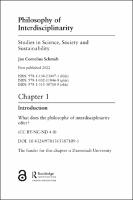Chapter 1 Introduction
Proposal review
What does the philosophy of interdisciplinarity offer?
| dc.contributor.author | Schmidt, Jan Cornelius | |
| dc.date.accessioned | 2022-03-02T11:17:08Z | |
| dc.date.available | 2022-03-02T11:17:08Z | |
| dc.date.issued | 2021 | |
| dc.identifier.uri | https://library.oapen.org/handle/20.500.12657/53175 | |
| dc.description.abstract | Interdisciplinarity—including its cognate transdisciplinarity—is a hallmark of contemporary knowledge production. The term is omnipresent in science, technology, and economy as well as in society and higher education—fueling the rhetoric of present-day knowledge politics. But what does interdisciplinarity stand for? What is, what was, and what should interdisciplinarity be, particularly for the future of our knowledge production? – These fundamental and related questions and their relevance to science policy and research practice are the subject of this introductory chapter. Starting from the diagnosis that interdisciplinarity has lost its critical momentum and its original spirit, the need for a Philosophy of Interdisciplinarity is sketched. In light of the ambivalence of the technosciences and the challenge of sustainable development, this engaged philosophy provides a novel perspective on interdisciplinarity in science policy and research practice. The opening chapter outlines the difference between a strategic-instrumentalist and a critical-reflexive view of interdisciplinarity, giving greater weight to the latter considering the future of our knowledge production. It sets out the line of argumentation pursued throughout the book, which seeks to inject a more critical viewpoint into the vibrant discourse on the concept and practice of interdisciplinarity for sustainable development. | en_US |
| dc.language | English | en_US |
| dc.subject.classification | thema EDItEUR::P Mathematics and Science::PD Science: general issues::PDR Impact of science and technology on society | en_US |
| dc.subject.other | History of Science; History of Technology; Philosophy of Technology; Scientific Ethics; Synthetic Biology | en_US |
| dc.title | Chapter 1 Introduction | en_US |
| dc.title.alternative | What does the philosophy of interdisciplinarity offer? | en_US |
| dc.type | chapter | |
| oapen.identifier.doi | 10.4324/9781315387109-1 | en_US |
| oapen.relation.isPublishedBy | 7b3c7b10-5b1e-40b3-860e-c6dd5197f0bb | en_US |
| oapen.relation.isPartOfBook | cc8609ba-efd4-4fdf-b145-eb87a6434c9c | en_US |
| oapen.relation.isbn | 9781138230071 | en_US |
| oapen.relation.isbn | 9781032118468 | en_US |
| oapen.imprint | Routledge | en_US |
| oapen.pages | 16 | en_US |
| oapen.remark.public | Funder name: Darmstadt University | |
| peerreview.anonymity | Single-anonymised | |
| peerreview.id | bc80075c-96cc-4740-a9f3-a234bc2598f1 | |
| peerreview.open.review | No | |
| peerreview.publish.responsibility | Publisher | |
| peerreview.review.stage | Pre-publication | |
| peerreview.review.type | Proposal | |
| peerreview.reviewer.type | Internal editor | |
| peerreview.reviewer.type | External peer reviewer | |
| peerreview.title | Proposal review | |
| oapen.review.comments | Taylor & Francis open access titles are reviewed as a minimum at proposal stage by at least two external peer reviewers and an internal editor (additional reviews may be sought and additional content reviewed as required). |

